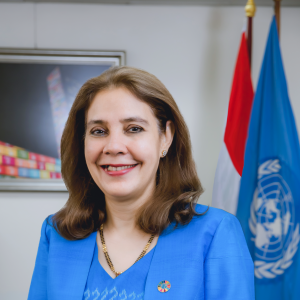Mr. Awidya Santikajaya, Deputy Director, Directorate of Trade, Industry, Commodity, and Intellectual Property, Ministry of Foreign Affairs
Torbjörn Fredriksson, Head, E-Commerce and Digital Economy Branch, Division on Technology and Logistics, UNCTAD
I am pleased to join you as we continue shaping the future of Indonesia’s digital trade in partnership with Government and the private sector.
Today, we are taking e-trade readiness to the next level in support of President Prabowo’s 8% annual growth target.
E-Trade is a great asset to Indonesia with its robust start-up ecosystem and equally robust youth dividend.
Half of Indonesians are under the age of 30, providing a tech-savvy consumer base and a dynamic workforce adept at leveraging digital technologies.
At the same time, internet penetration will reach every household by 2030, supporting faster growth of the digital economy.
Indonesia’s digital economy contributes to nearly a tenth of the country’s GDP.
The integration of e-trade and digital commerce will further drive growth, including AI, whose untapped potential in Indonesia is enormous.
Globally, digital trade and e-commerce have transformed economies by fostering innovation, boosting financial inclusion, and expanding market reach.
They will yield the same benefits in Indonesia.
Importantly, digital trade breaks down geographical barriers, allowing Indonesian businesses to sell products worldwide.
This is critical for bridging the gender gap in e-commerce as evidence tells us that most women-led businesses trade only within ASEAN, limiting their market potential.
The UN, in partnership with government is facilitating some of these businesses to expand their markets to the UK and EU in sectors such as textiles, apparels, handicrafts and footwear.
However, increased access to the internet and e-commerce come with increased cyber security risks.
Indonesia remains vulnerable to cyber threats, highlighting the need for stronger cybersecurity measures to protect the online ecosystem for e-commerce.
An e-Trade Readiness Assessment is a vital first step.
UNCTAD has conducted similar assessments globally with Indonesia being the first G20 nation.
These assessments will also support ASEAN’s broader economic integration and growth in line with the UN Global Digital Compact.
It will evaluate the country’s policy, legal, and regulatory frameworks to identify opportunities for reform and sustainable growth.
This partnership will build a robust, inclusive and transparent digital economy.
Thank you.




